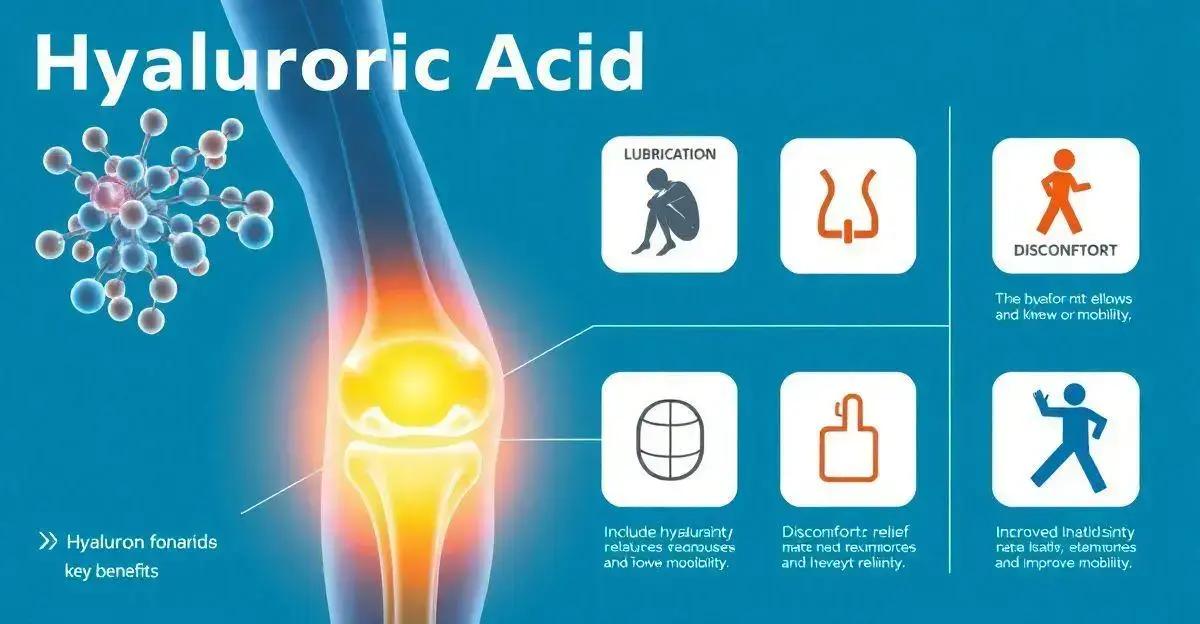Hyaluronic acid is essential for joint health, providing lubrication and cushioning. It can be obtained from foods like bone broth and leafy greens, as well as through supplements and injections. Benefits include improved mobility, reduced pain, and better cartilage health, with typical oral dosages ranging from 100 mg to 200 mg daily. Injections should be administered by healthcare professionals. While generally safe, possible side effects include injection site reactions and allergic responses, so consulting a healthcare provider before starting treatment is recommended.
Hyaluronic acid is a powerful compound known for its significant role in joint health. This naturally occurring substance helps lubricate joints, alleviate discomfort, and improve overall mobility.
In this article, we will explore the top benefits of hyaluronic acid for joint health, including its sources, recommended dosages, and potential side effects.
What is Hyaluronic Acid?
Hyaluronic acid is a naturally occurring substance found throughout the body, particularly in connective tissues, skin, and synovial fluid.
It is classified as a glycosaminoglycan, which is a long chain of sugar molecules that plays a vital role in retaining moisture and providing structural support.
In the context of joint health, hyaluronic acid is a key component of synovial fluid, which acts as a lubricant for joints.
This lubrication is essential for reducing friction between bones during movement, helping to prevent wear and tear on cartilage.
Additionally, hyaluronic acid aids in the transport of nutrients and the removal of waste products within the joint space, contributing to overall joint health and function.
As we age, the natural production of hyaluronic acid in the body decreases, which can lead to joint stiffness, discomfort, and a reduced range of motion.
Understanding what hyaluronic acid is and its significance in maintaining joint health is crucial for exploring how supplementation or treatments involving this compound can benefit those experiencing joint issues.

How Hyaluronic Acid Benefits Joint Health
The benefits of hyaluronic acid for joint health are numerous, making it an effective option for individuals looking to alleviate discomfort and enhance mobility. Here are the primary ways hyaluronic acid can benefit your joints:
Enhanced Lubrication: Hyaluronic acid is essential for maintaining the viscosity of synovial fluid, which lubricates joints and reduces friction between bones. This lubrication is critical for smooth joint movement and helps prevent damage to cartilage.
Shock Absorption: Acting as a cushion within the joint, hyaluronic acid absorbs shocks during activities such as walking or running. This property is particularly beneficial for people engaged in high-impact activities or those suffering from osteoarthritis.
Pain Relief: Studies have shown that hyaluronic acid injections can significantly reduce pain in individuals with osteoarthritis. By improving joint lubrication, it helps to alleviate discomfort during movement.
Improved Mobility: Regular use of hyaluronic acid has been linked to enhanced joint mobility. Proper lubrication allows for a greater range of motion, making daily activities easier and more comfortable.
Support for Cartilage Health: Hyaluronic acid may stimulate the production of synovial fluid and support the maintenance of cartilage health, which is vital for preserving joint function as we age.
Incorporating hyaluronic acid into your joint health regimen—whether through diet, supplements, or injections—can provide these benefits, making it a valuable resource for anyone looking to support their joint health and reduce discomfort.
Sources of Hyaluronic Acid
Hyaluronic acid can be obtained from various natural and synthetic sources. Here are some common sources to consider:
Natural Sources: Hyaluronic acid is present in several foods that are rich in collagen and other nutrients beneficial for joint health. Some examples include:
- Bone Broth: This nutrient-dense broth is made by simmering bones and connective tissues, extracting hyaluronic acid along with collagen and minerals that support joint health.
- Animal Products: Meats, particularly organ meats (like liver), and shellfish contain hyaluronic acid, as it is found in the connective tissues of these animals.
- Leafy Greens: Vegetables such as spinach and kale have compounds that may help stimulate the body’s own production of hyaluronic acid.
- Root Vegetables: Foods like sweet potatoes and carrots can also contribute to enhancing hyaluronic acid levels in the body.
Supplements: Hyaluronic acid supplements are widely available in various forms, including capsules, tablets, and powders. These supplements can help boost the body’s hyaluronic acid levels, promoting joint health and overall hydration.
Topical Products: Many skincare products contain hyaluronic acid due to its excellent moisturizing properties. While these products primarily target skin hydration, they can also indirectly support joint health by promoting overall hydration in the body.
Injections: For individuals suffering from joint issues, hyaluronic acid injections are a common therapeutic option. These injections are administered directly into the joint space to provide immediate lubrication and alleviate pain.
By incorporating these sources of hyaluronic acid into your diet or healthcare routine, you can effectively support joint health and improve overall well-being.

Dosage and Administration
Understanding the proper dosage and administration of hyaluronic acid is crucial for maximizing its benefits for joint health. Here are key points to consider:
Oral Supplements: Hyaluronic acid is available in various forms, including capsules, tablets, and powders. The typical dosage ranges from 100 mg to 200 mg per day. It’s advisable to follow the manufacturer’s guidelines or consult with a healthcare professional for personalized recommendations.
Injections: For individuals with more severe joint issues, hyaluronic acid injections are often recommended. These are usually administered by a healthcare professional directly into the affected joint. A common approach involves a series of one to three injections given over a few weeks, tailored to the severity of the condition and the specific product used.
Topical Applications: While hyaluronic acid is primarily recognized for joint health through oral or injectable forms, it can also be found in topical creams and gels. These are applied directly to the skin over the affected joint areas. Although absorption may vary, they can provide localized hydration and potentially enhance joint comfort.
Timing: For oral supplements, consistency is key. It’s often recommended to take hyaluronic acid supplements with meals to enhance absorption and effectiveness. For injections, follow your healthcare provider’s schedule for optimal results.
Consultation with Healthcare Professionals: Before starting any new supplement regimen, especially if considering injections, it’s important to consult with a healthcare provider. They can help determine the appropriate dosage based on individual health needs, medical history, and potential interactions with other medications.
By adhering to recommended dosages and administration methods, individuals can better harness the joint health benefits of hyaluronic acid, leading to improved mobility and reduced discomfort.
Potential Side Effects
While hyaluronic acid is generally considered safe and well-tolerated, it’s important to be aware of potential side effects that may occur, especially when used in higher doses or through injections. Here are some common side effects to watch for:
Injection Site Reactions: When hyaluronic acid is administered via injections, some individuals may experience temporary reactions at the injection site. This can include:
- Pain
- Swelling
- Redness
- Bruising
These symptoms typically resolve within a few days.
Allergic Reactions: Although rare, some people may have an allergic reaction to hyaluronic acid. Signs of an allergic reaction can include:
- Itching
- Rash
- Difficulty breathing
If any of these symptoms occur, it’s important to seek medical attention immediately.
Gastrointestinal Discomfort: Oral hyaluronic acid supplements might cause mild gastrointestinal issues in some individuals, such as:
- Nausea
- Diarrhea
- Stomach cramps
If these symptoms persist, consider consulting with a healthcare provider.
Interactions with Other Medications: Hyaluronic acid may interact with certain medications, such as anticoagulants (blood thinners). If you are on medication, it’s important to discuss with your healthcare provider before starting hyaluronic acid.
Overall, while side effects are infrequent, being informed about potential issues allows individuals to make educated decisions about using hyaluronic acid for joint health. Always consult with a healthcare professional if you have concerns or experience any adverse effects.
Conclusion
In conclusion, hyaluronic acid plays a vital role in promoting joint health through its exceptional lubricating and cushioning properties.
By understanding its sources, benefits, dosage, and potential side effects, individuals can make informed decisions regarding its use.
Whether through dietary sources, supplements, or injections, incorporating hyaluronic acid into your routine can significantly improve mobility and reduce discomfort associated with joint issues.
As always, consulting with a healthcare professional before starting any new treatment is crucial to ensure that you receive personalized advice tailored to your specific health needs.
With the right approach, hyaluronic acid can be a valuable ally in maintaining joint health and enhancing your overall quality of life.
FAQ – Common Questions About Hyaluronic Acid and Joint Health
What is hyaluronic acid and how does it help joints?
Hyaluronic acid is a naturally occurring substance that lubricates joints, reduces friction, and helps cushion impacts, promoting overall joint health.
Are there any side effects of taking hyaluronic acid?
While generally safe, some people may experience injection site reactions, allergic reactions, or mild gastrointestinal discomfort when taking oral supplements.
How can I increase my hyaluronic acid levels naturally?
You can boost hyaluronic acid levels by consuming bone broth, animal products, leafy greens, and root vegetables, or through supplements.
What is the recommended dosage for hyaluronic acid supplements?
Typical dosages range from 100 mg to 200 mg per day for oral supplements, but it’s best to follow the manufacturer’s instructions or consult a healthcare provider.
How are hyaluronic acid injections administered?
Hyaluronic acid injections are administered directly into the affected joint by a healthcare professional, usually in a series of one to three treatments.
Can hyaluronic acid interact with other medications?
Yes, hyaluronic acid may interact with certain medications, especially anticoagulants. Always consult a healthcare provider before starting new supplements.


